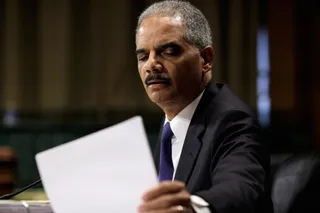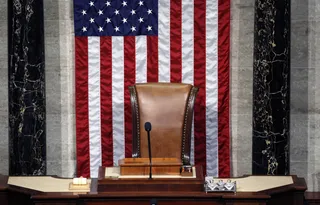Fast and Furious: For Real, Not the Movie
Eric Holder is vindicated in gun-trafficking program.

1 / 14
Vindication - The Justice Department’s Inspector General on Sept. 19 issued a report that clears U.S. Attorney General Eric Holder of having any knowledge of the controversial “Fast and Furious” gun-tracking program before Congress began its inquiry in 2011. “It is unfortunate that some were so quick to make baseless accusations before they possessed the facts about these operations – accusations that turned out to be without foundation and that have caused a great deal of unnecessary harm and confusion,” Holder said. Here’s how it began. —Joyce Jones (Photo: AP Photo/Susan Walsh, File)

2 / 14
What Is Operation Fast and Furious? - Operation Fast and Furious is a spinoff of Project Gunrunner, a Bureau of Alcohol, Tobacco, and Firearms (ATF) program started under President George W. Bush's administration in 2006 which allowed traceable firearms to go into Mexico with the hope of tracking the guns to high-ranking Mexican drug cartel members. ATF is an agency of the Department of Justice (DOJ). (Photo: Courtesy ATF)

3 / 14
How Did That Work Out? - Very badly. During President Obama's administration, more than 2,000 firearms crossed the border; 1,700 have been lost; some have been found at crime scenes in Mexico and the U.S., including the December 2010 shootout that resulted in the death of U.S. Border Patrol agent Brian Terry.(Photo: Detroit Free Press/MCT/Landov)

4 / 14
How Did a Misguided Operation Become a Big Scandal? - After Brian Terry's death, ATF whistleblowers came forward, prompting Sen. Charles Grassley, the ranking Republican on the Senate Judiciary Committee, and House Oversight Committee Chairman Darrell Issa to launch investigations into Fast and Furious.(Phtoo: AP Photo/Matt York)

5 / 14
Where's the Smoking Gun? - Part of the dispute is a question of who knew what and when. Holder told Congress last May he only learned about it "in the last few weeks," but memos sent to him in July 2010 contradict that claim. In addition, in November 2011, Holder testified before the Senate Judiciary Committee that a Feb. 4 letter from the Department of Justice to Grassley that stated "ATF makes every effort to interdict weapons that have been purchased illegally and prevent their transportation to Mexico" was "inaccurate."(Photo: Mark Wilson/Getty Images)
ADVERTISEMENT

6 / 14
Why Can't Issa and Holder Get Along? - Issa contends Holder is stonewalling, while the attorney general argues that his agency has made an "unprecedented" effort to accommodate the Oversight panel's requests without violating the law or jeopardizing future prosecutions related to its own investigations into illegal gunrunning.(Photo: Mark Wilson/Getty Images)

7 / 14
Is That Why Issa Is Still Gunning for Holder? - DOJ turned over 7,600 pages of records, but Holder refused to give the committee internal communications made after Feb. 4 relating to the department's response to the controversy and the ensuing congressional investigations. According to Cummings, the Republicans on the Oversight panel wanted to know what happened after Feb. 4 and whether there was an effort to retaliate against the whistleblowers.(Photo: Mark Wilson/Getty Images)

8 / 14
Why Did Holder Resist Issa's Request? - Cummings says the documents, or "internal deliberations," are like attorney-client privileged information. Holder voluntarily gave up 1,000 pages of notes from before Feb. 4 and was willing to produce more, even though past attorney generals have resisted such requests. But he also maintained that turning over post-Feb. 4 documents would have "significant, damaging consequences" and impair criminal prosecutions.(Photo: Chip Somodevilla/Getty Images)

9 / 14
Was It Personal or Just Business? - Cummings said Issa's motives were based purely on election-year politics and not fact. The Democrats who sit on the committee agreed that Holder is being unfairly scapegoated. Their belief is underscored by the fact that some Republican lawmakers, including Sen. John Cornyn, had called for Holder to resign, citing among their reasons his efforts to protect voting rights.(Photo: Chip Somodevilla/Getty Images)
Photo By Chip Somodevilla/Getty Images

10 / 14
What Was the White House's Position? - The White House fully backed Holder and intervened by asserting executive privilege over the contested documents because, it said, the documents are covered under "presidential communications privilege." But the panel moved forward with the contempt vote, which passed along party lines by 23 to 17. Republican lawmakers argued that the White House asserted executive privilege because it was "hiding" something, a claim that spokesman Jay Carney denounced. (Photo: REUTERS/Kevin Lamarque)
ADVERTISEMENT

11 / 14
So, What Happened Next? - House Speaker John Boehner pledged to follow the Oversight Committee and bring a vote to the House floor to cite Holder for contempt. (Photo: Alex Wong/Getty Images)
![In Contempt - The House of Representatives, by a largely party line vote, cited U.S. Attorney General Eric Holder for contempt in June for withholding documents related to the controversial Operation Fast and Furious. Democrats all along agreed that there was indeed a need to investigate how the gun trafficking program went so awry, but as Rep. Elijah Cummings, a key player in the unfolding drama, said, despite Holder's efforts to accommodate the committee’s requests, the "goal posts were constantly being moved."(Photos: Chip Somodevilla/Getty Images[2]; Win McNamee/Getty Images)](https://images.paramount.tech/uri/mgid:arc:imageassetref:bet.com:ae35a36b-2948-420c-a922-c588f82ed8b6?format=webp&width=320)
12 / 14
In Contempt - The House of Representatives, by a largely party line vote, cited U.S. Attorney General Eric Holder for contempt in June for withholding documents related to the controversial Operation Fast and Furious. Democrats all along agreed that there was indeed a need to investigate how the gun trafficking program went so awry, but as Rep. Elijah Cummings, a key player in the unfolding drama, said, despite Holder's efforts to accommodate the committee’s requests, the "goal posts were constantly being moved."(Photos: Chip Somodevilla/Getty Images[2]; Win McNamee/Getty Images)

13 / 14
What Happens When an Official Is Cited for Contempt? - Rep. Lacy Clay, who sits on the panel, said that criminal or civil charges could be brought against Holder and that he could even be arrested. But Cummings said it would never come to that and the U.S. Attorney for the District of Columbia declined to move forward with the case. "It has always been their position in the past that if an action for contempt is brought and the president asserts executive privilege, the U.S. Attorney won't proceed with it,” Cummings said.(Photo: Mark Wilson/Getty Images)
Photo By Mark Wilson/Getty Images
